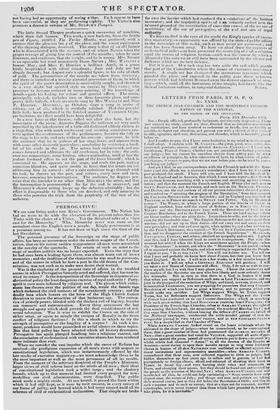PREROGATIVE!
WE are now living under TILE KING'S Government. The Nation has had no more to do with the elevation of its present rulers than the Turks with the choice of a Vizier. Yet the Standard talks of a "last cast for the Monarchy." Why, Monarchy never was more on the ascendant since the English were a people. Kingly government is at a premium among us. It has not been so high since the time of the last Revolution.
The personal presence of the Sovereign on the stage of public affairs, has been so uncommon under the modern usages of the Consti- tution, that on his recent sudden reappearance all men were astonished at the novelty of the spectacle. The return of such an actor to the stage of modern polities was no longer expected. Even the story that he had once been a leading figure there, was almost worn out of men's memories; and the tradition of the characters he was used to personate, and of the scenes in which he bore a part in the old drama of the Con- stitution, was not such as to make men desire their revival. Was it the similarity of the present state of affairs to the troubled
scenes in which Prerogative formerly acted and suffered, that has now in- vited its return ? Is the interposition of the Sovereign in disputes of ec- clesiastical policy the least dangerous exercise of regal authority ? Party- spirit is once more inflamed by religious zeal. The gloom which enthu- siasm has thrown over the politics of our day, recals the fanatic rage which darkened the civil contests of the seventeenth century; and the deadly hate which lowers on the brow of the High Church faction threatens to renew the atrocities of that barbarous age. The emissa. ries of priestly power, blinded with the thickest veil of bigotry, breathe out massacre and extermination. Every thing announces the last struggle and agony which shall precede the final establishment of uni- versal toleration. Was it wise to exhibit the Crown on the side of either array, or again to mingle the ensigns of Royalty in the fierce conflict of religious factions? Is this a shock in which to try the strength of prerogative or the fragility of a sceptre ? At such a mo. ment, prudence would have prescribed an awful silence on these topics. But that fatal policy has been adopted which all history denounces. Prerogative has again plunged headlong into a religious contest, and the association of ecclesiastical with executive abuses has been rendered more intimate than ever.
When we consider the vast impulse which the cause of Reform has received—the prodigious expansion of all men's views with respect to constitutional legislation, which was instantaneously effected by the late stroke of executive magistnicy—we must acknowledge these to be the most important as well as the most permanent of all its results. From the moment of the arbitrary dismissal of the People's Ministers, larger views of civil reform burst on the minds of all men ; their ideas of constitutional legislation took a wider range ; and the shadowy bounds, which up to that moment had limited every project for new- modelling our civil administration, were .dispelled. The public mind made a mighty stride. At one bound, it passed the limit within which it had still kept, as it were by tacit consent, in every survey of our frame of polity, and beyond which it bad never ranged amid all its schemes of civil or ecclesiastical melioration. That simple act broke
for ever the balder which had ,confined the s or the boldest
innovator; and the inquisitive spirit* of it en 'latently rushed into the Weaned ground of the coestitution of executive power, of the tel mire of maeistracy, of the use of prerogative, of the e.ul and aim of regal authority.
To have ex ilted in the eyes of the world the Kingly species of execu- tive megistracy, in °Nee tuuity was offered by the state of leiblic affairs to the Sovereign of this realm, such as man never yet eossessed ; and that has been throve,' away. To have suit aloof from the comet:us of
erelesiastival policy—to have preserved the mem ality of C- vii bun ion o mid the storms Id FelieitHIS faCti011—twell was the VOUS.. 113, Whio-h a Monarchy like mars mis lit still have been surrounded by the silence and darkness which ate its best defenee.
But it is past. Ore rash step luta torn aside the veil which guards that part.of the Constitution win-re the image of executive maeistraey stands. A single act has dissipated the mysterious revertmwe shirk guanded the place. and exposed to the public gaze those inuknown powers which hind hitherto frawned away the distant approach of scru- tiny—whit-le amid all the lustrations of the temple, had dwelt. like the
idols of bulb:irons nations, in congenial darkness. Seim.


















 Previous page
Previous page